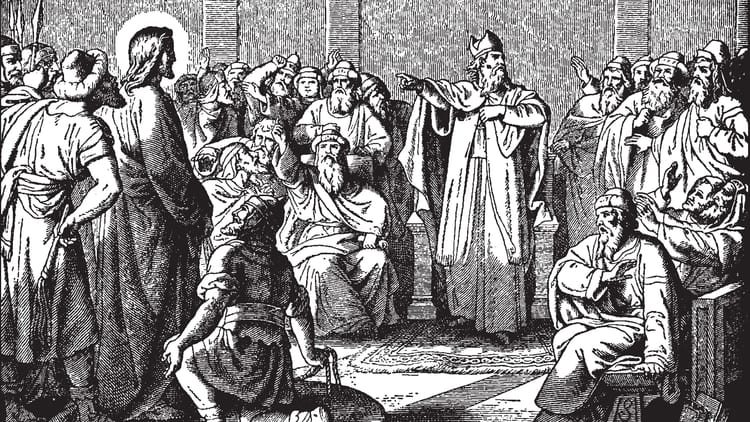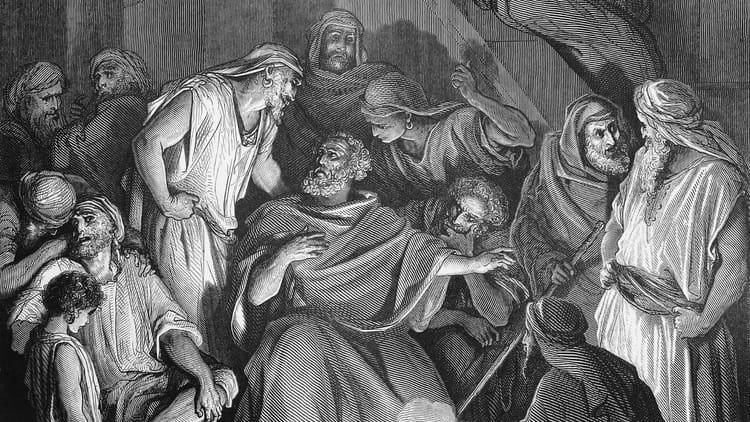Becoming Clean (Mark 7:1-23)

At first glance, today’s passage seems like it’s a fight over an arcane issue that doesn’t involve us at all. But, actually, this passage is very much about an issue that concerns all of us. The issue is really what is wrong with us, and what we should do about it. The religious leaders of Jesus' time point out a problem that affects all of us. Jesus even agrees with them that there’s a problem. But then Jesus shows us that the way we normally deal with the problem is wrong, before we get a hint of the right way to deal with the problem.
So first, what’s the problem?
The real issue in this passage is simply moral purity. The main point of this passage is often overlooked because it is presented in the context of Jewish laws and traditions regarding cleanliness. However, the underlying issue is something that affects everyone. We have a feeling that there is something wrong with us. We believe we need something to purify and transform us into the person we are meant to be.
If you read the Old Testament laws, especially in the book of Leviticus, then you discover that there are a lot of laws about uncleanness. Over and over again you read about clean and unclean and holy in the book of Leviticus. Some of the laws seem so arcane that when we read them we get frustrated and wonder what in the world they have to do with us.
One of the problems we have is that we think that clean means hygienic, like when your mother tells you to wash your hands because they’re dirty before you come to eat your lunch. Clean in the Bible really doesn’t have to do with hygiene, but of being purified and cleansed so that you could approach God. Because God is completely holy and without any defilement at all, God required that the people approach him in purity. And so Leviticus spends a lot of time explaining what makes people clean and unclean. The term occurs over 70 times in the book of Leviticus. We don’t understand all the reasons behind all of these commands, but we kind of get the idea that we can’t approach God just as we are because we’re unclean. We know that there’s something wrong with us. Once again, the key issue lies not in hygiene, but in our preparedness to come before God.
The bottom line in Leviticus is that if you’re unclean – and there are many ways that you can become unclean – you have no access to God. If you’re an ordinary person, and you are unclean for whatever reason, then you are temporarily cut off from the other people until you’re made clean again. But if you’re a priest, then it’s even more serious. God says to the priests, “For the generations to come, if any of your descendants is ceremonially unclean and yet comes near the sacred offerings that the Israelites consecrate to the LORD, that person must be cut off from my presence. I am the LORD” (Leviticus 22:3).
As you read the Old Testament, you at first think that it’s all about these arbitrary rules about what you can touch and what you can eat. It’s frustrating too because there’s no real way you can avoid becoming unclean at least some of the time. It’s only later that you begin to see that it’s not really about rules and technicalities. All of these point to something much deeper: our hearts. So when Isaiah encounters God, he’s filled with fear and cries out, “Woe to me! I am ruined! For I am a man of unclean lips, and I live among a people of unclean lips, and my eyes have seen the King, the LORD Almighty” (Isaiah 6:5). He knows that he’s in no condition to stand in God’s presence. His very life is in danger. Isaiah says again in chapter 64, “All of us have become like one who is unclean, and all our righteous acts are like filthy rags; we all shrivel up like a leaf, and like the wind our sins sweep us away.”
If we’re honest, all of us can look at ourselves as well and acknowledge that yes, no matter who we are, that this is a problem. All of us sense that there’s something deeply wrong, deeply unclean about our hearts. And it affects even the best of us. Kay Warren, a pastor’s wife, tells of the first time she visited Rwanda. She had heard about the 1994 genocide that had left a million people dead – tortured, raped, and murdered. “I naively assumed I would be able to look men and women in the eyes and tell if they had been involved,” she says.
I was full of self-righteous judgment… Instead of finding leering, menacing creatures, I met men and women who looked and behaved a lot like me… There were no monsters in Rwanda, just people like you and me… Before that trip, I can’t tell you the number of times I reacted to evil I read about or witnessed by saying, “I would never do that!” But thousands of years of bloody human history prove differently. Fifty-four years of my own history prove differently. We are all proficient in our ability to conceive, plan, and execute evil… You might as well face the shameful truth: You and I, put in the right situation, will do absolutely anything. Given the right circumstances, I am capable of any sin. I’ve grown more afraid of the monster lurking in the dark corners of my soul than of any monster lurking in the dark corners of my house.
Aleksandr Solzhenitsyn puts the problem well:
If only there were evil people somewhere insidiously committing evil deeds, and it were necessary only to separate them from the rest of us and destroy them. But the line dividing good and evil cuts through the heart of every human being. And who is willing to destroy a piece of his own heart?
This is our biggest problem. And if you look carefully at this passage, Jesus agrees that this is our problem. In fact, he even raises the stakes in identifying the seriousness of the problem. We are unclean. We're like Lady Macbeth, saying "Out, damn spot!" This is our problem.
So how do we normally deal with this problem?
As detailed as the laws in the Old Testament are, they only required priests to wash hands before offering a sacrifice. Only priests, and only when offering a sacrifice. Exodus 30:18-21 says:
Make a bronze basin, with its bronze stand, for washing. Place it between the tent of meeting and the altar, and put water in it. Aaron and his sons are to wash their hands and feet with water from it. Whenever they enter the tent of meeting, they shall wash with water so that they will not die. Also, when they approach the altar to minister by presenting a food offering to the LORD, they shall wash their hands and feet so that they will not die. This is to be a lasting ordinance for Aaron and his descendants for the generations to come.
God’s Law never required that ordinary people eat regular meals in a state or ritual cleanliness. But we get to Mark 7, and we read in verses 3 and 4:
The Pharisees and all the Jews do not eat unless they give their hands a ceremonial washing, holding to the tradition of the elders. When they come from the marketplace they do not eat unless they wash. And they observe many other traditions, such as the washing of cups, pitchers and kettles.
They had taken instructions meant for priestly washing at the moment of sacrifice, and applied it to all life in a way that God had never intended. This wasn’t written in Scripture, but we read that these traditions had developed – as yet unwritten rules that many held to be on par with God’s written commands.
What had happened is that people had identified a legitimate problem: the impurity of our hearts. And they had devised a system of dealing with this problem: man-made rules that, if kept, made them feel like they were no longer unclean. And not only did they adopt these man-made rules for themselves, but they used them as a club to judge others. In this passage, they use their man-made rules as a way of clubbing Jesus. When we sense the uncleanness of our hearts, we always look to some other justification, some other standard by which we approve ourselves and judge others. This is actually the basis of all religion and even many within Christianity: we think that if we meet certain standards and do certain things, unlike those dirty people, then we’re in. We have solved our issue with being unclean. These are outside-in approaches. We think if we adopt certain behaviors and meet certain standards, then we’re in.
Let me give you a test. If I said, “What makes you acceptable to God?” what would you say? Most of the answers we give reveal what we’re looking to in order to be justified before God. If we think that there is anything that we have done or can do to make us clean before God, then we are in the exact same position that these religious leaders were in. We’re trusting in something to justify us before God that won’t work no matter how well we meet the standards.
Jesus had very harsh words for this. He just tears into the religious leaders. There are two basic problems with trying to justify God through our man-made, external rules.
First, Jesus says, we end up undermining the Word of God. When we create man-made rules in what starts out to be a well-meaning attempt to justify ourselves with God, it isn’t long before we create rules that end up rejecting God-given priorities. He gives the example of somebody making a vow to dedicate some of their money to God, therefore making that money unavailable for honoring their father and mother. But there are other examples:
- being so careful about morality that we forget that Christ died for the ungodly;
- being so focused on church attendance and activities that we neglect our families and our neighbors;
- being so concerned with good theology that we stop loving those who don’t agree in every detail with us
Religion always gets us focused on the wrong things at the expense of what God wants us to be about. “You do many things like that,” Jesus says in verse 13.
The other problem is that when we try to justify ourselves using man-made, external rules, we never really get to the heart of the issue, which is the heart. To illustrate this, Jesus uses a crude example. If you eat a piece of unclean food, he says, it goes into your mouth, and down to your stomach, and eventually, he says, it goes into the latrine. It never gets to your heart. So the problem is actually more serious than you think, because all the hand-washing in the world, all the external man-made rules, never get to the heart of the issue. The heart of the issue is that we have impure hearts. The problem is that at our core, and the center of who we really are, there’s something seriously wrong.
Jesus says in verses 21 to 23:
For from within, out of your hearts, come evil thoughts, sexual immorality, theft, murder, adultery, greed, malice, deceit, lewdness, envy, slander, arrogance and folly. All these evils come from inside and defile you.
Nothing you do externally will deal with the problem of an unclean heart. This is actually very depressing. Jesus says that yes, the Pharisees and scribes are right that there is something fundamentally unclean with us. But he rejects religion as a way of dealing with this. There is nothing we can do to scrub ourselves and make us clean no matter what we do. The ultimate problem with us is the impurity of our heart, and religion can’t solve that problem.
So this passage shows us the extent of our problem. It also shows us the impossibility of cleansing ourselves. As one theologian put it, “Even saints cannot perform one work which, if judged on its own merits, is not deserving of condemnation” (John Calvin). Where does this leave us?
This passage also points us to what has to happen, what is, after all, our only hope.
So we see we have this problem. We also see that religion and man-made rules really don’t solve this problem. So what do we do?
There’s an interesting parenthetical comment at the end of verse 19. It’s significant because Mark hardly makes any editorial comments. He says, “In saying this, Jesus declared all foods clean.” What does Mark mean by this? There are all kinds of laws about clean and unclean food in the Old Testament. What Mark is telling us is that Jesus is the fulfillment of all of these laws, and that he has done something that renders all the laws about clean and unclean food obsolete.
Hundreds of years earlier, God revealed that the day would come that he would deal with this problem.
I will sprinkle clean water on you, and you will be clean; I will cleanse you from all your impurities and from all your idols. I will give you a new heart and put a new spirit in you; I will remove from you your heart of stone and give you a heart of flesh. And I will put my Spirit in you and move you to follow my decrees and be careful to keep my laws. Then you will live in the land I gave your ancestors; you will be my people, and I will be your God. I will save you from all your uncleanness. (Ezekiel 36:26-29)
The day will come, God said, when we won’t have to worry about our unclean hearts anymore, because God will give us new hearts. “I will save you from all your uncleanness,” God promises.
One of the most beautiful pictures of this is found in a passage in Zechariah 3. Zechariah sees a scene in heaven in which Joshua, the high priest at that time, appears before God. Remember how much work the priests had to go through in order to cleanse themselves? The High Priest would only come before God once a year at Yom Kippur, the Day of Atonement, after a week of preparation because you can’t appear before God in an unclean state.
Zechariah sees Joshua appear before God. Satan is there too to accuse him. And we read, “Now Joshua was dressed in filthy clothes as he stood before the angel” (Zechariah 3:3). In the original it says he’s in clothes that are covered with excrement. It’s a picture of how we must look to God as we come before him in all our righteousness. He’s there on the Day of Atonement, but there’s big trouble because he’s unclean. There’s no way he can stand before God, and Satan is there to accuse him. It’s a disaster.
But before Satan can even speak, the angel says, “Take off his filthy clothes.” And then the angel says to Joshua, “See, I have taken away your sin, and I will put fine garments on you” (Zechariah 3:4). God strips away his uncleanness and provides clothes that he couldn’t provide for himself. He’s reclothed in God’s presence and even given a turban, which at that time would have signified royalty. He comes before God covered with excrement, and in God’s presence he’s given ceremonially pure garments as a sign that God accepts him and the people that he represents.
The prophets point us to the cleansing that only God can provide. God, they say, will deal with the uncleanness of his people by providing cleansing and acceptance at the deepest level. God will take away our filthy clothes in his presence, and Satan our accuser won’t be allowed to say a word.
Mark has told us that the laws of clean and unclean laws have found their fulfillment in Christ. Christ cleanses the heart.
No condemnation now I dread; Jesus, and all in Him, is mine! Alive in Him, my living Head, And clothed in righteousness divine, Bold I approach the eternal throne, And claim the crown, through Christ my own.
Father, we repent of our efforts to cleanse ourselves. We thank you that in your presence, our filthy clothes can be removed, and we can be clothed with the righteousness of Christ. May everyone here experience that cleansing and sing: Amazing love! How can it be, That Thou, my God, shouldst die for me?





